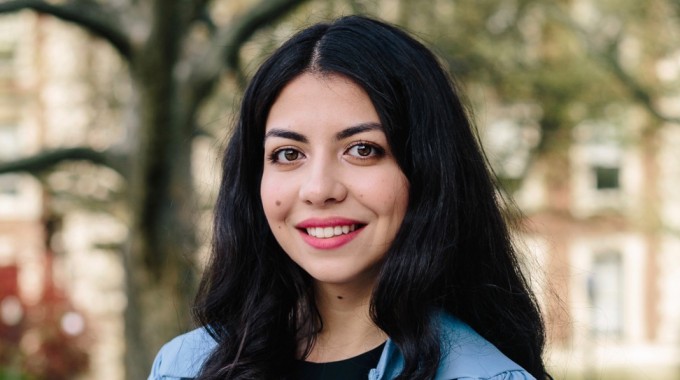If you know of a Columbia College student, faculty member, alumnus/alumna or program we should spotlight, or if you would like to submit a story, please contact:
Columbia College
Office of Communications
cc-comms@columbia.edu

“Columbia gives you the opportunity, this platform to be very proactive — it really gives you a self confidence that yes, you are capable.”—Elif Memet CC’19
Elif Memet CC’19 discovered Nobel laureate, economist and University Professor Joseph Stiglitz long before she arrived at Columbia College. Growing up in Romania, “we did not have economics in the national curriculum. So I started reading papers on my own and in eighth grade, I found some of Professor Stiglitz’s articles,” she said.
She dove into the economic and social justice imperatives and the diminishing quality of opportunity that he addressed, and followed his appearances on YouTube. At the same time, the European sovereign debt crisis was deepening. “It was so pervasive in our societies. He was so logical,” she said. “Listening to the interviews … he also had a natural warmth. I really wanted to learn from him.”
Her first sliver of a chance came during admissions season. By then, Memet had won several international competitions in environmental science, earning recognition from NASA and the Romanian government. But the young scientist with a penchant for microfinance also had a passion for policy making and was interested in learning more about literature, philosophy, art and music. Enter Columbia College.
Getting “a very structured introduction to humanities while pursuing my interest in mathematics and economics was something I really wanted,” Memet says.
“I remember being on campus and looking at Butler [Library] and seeing all of these [philosophers’] names,” she said. “I really wanted to come here and graduate knowing how to read equally well a page from The Economist as I do a page from Homer.”
In her first semester, in addition to class, Memet introduced herself to Stiglitz’s office, explored the city and began working with committees of the Columbia Club, where her idol would end up having a book release event. She bought a ticket and went.
To her surprise, the executive director of the club asked to move Memet after the event began. Worried — “I chose my seat to not disturb anyone” — she followed.
“I went with her and then she stops at Professor Stiglitz’s table. And then, I see my name right next to his, right next to Professor Stiglitz — beyond my belief,” Memet said. “He was just like [he seemed] — honest, humble, so outspoken about what’s going on in the economy and in the world.”
Memet had her book signed and as the event ended, took her opportunity as Stiglitz departed.
“I ran after him and said, ‘Professor Stiglitz, I read your work for four or five years, how can I just be around you and learn from you?’” She remembers the professor laughed in a kind way. “I did not even dream of becoming a research assistant. He asked me if I had taken econometrics — at this stage I had not, I only took ‘Principles of Economics.’ He laughed again.”
On the subway, the two talked about Romania, its institutions and economy, and the Greek referendum of 2015 — all of which had lined Elif's interest and path to Columbia.
In a formal interview soon after, Memet expressed to Stiglitz her interest in researching income inequality. With funding from the Science Research Fellowship, she began assisting Stiglitz with research on the U.S. healthcare economy, appreciating the “learning curve” that came with it since the healthcare system in the U.S. itself was something she had to learn.
“I knew I wanted to develop academically, and I did that through research and coursework,” Memet says. “I knew I wanted to learn public sector and institutions; I did that, sometimes by a subway ride to the UN...going to forums I could not have at another school. This is a place where you can do anything research-wise, policy-wise and also culturally and charity-oriented.”
Memet, who will develop her private sector experience as a Goldman Sachs analyst after graduation, also hopes to continue to support charities focused on arts and youth education after successfully organizing a fundraiser for the Romanian National Opera at Lincoln Center as part of her work with the Princess of Romania.
“Columbia gives you the opportunity, this platform to be very proactive — it really gives you a self confidence that yes, you are capable,” she says, citing sustained curiosity and interest in ideas that she experienced in both meetings with Stiglitz and classes with peers. “The expectation that you are capable makes you confident in yourself as well.
“You can also be an active participant,” she says, “not just a passive observer, regardless of your age.”